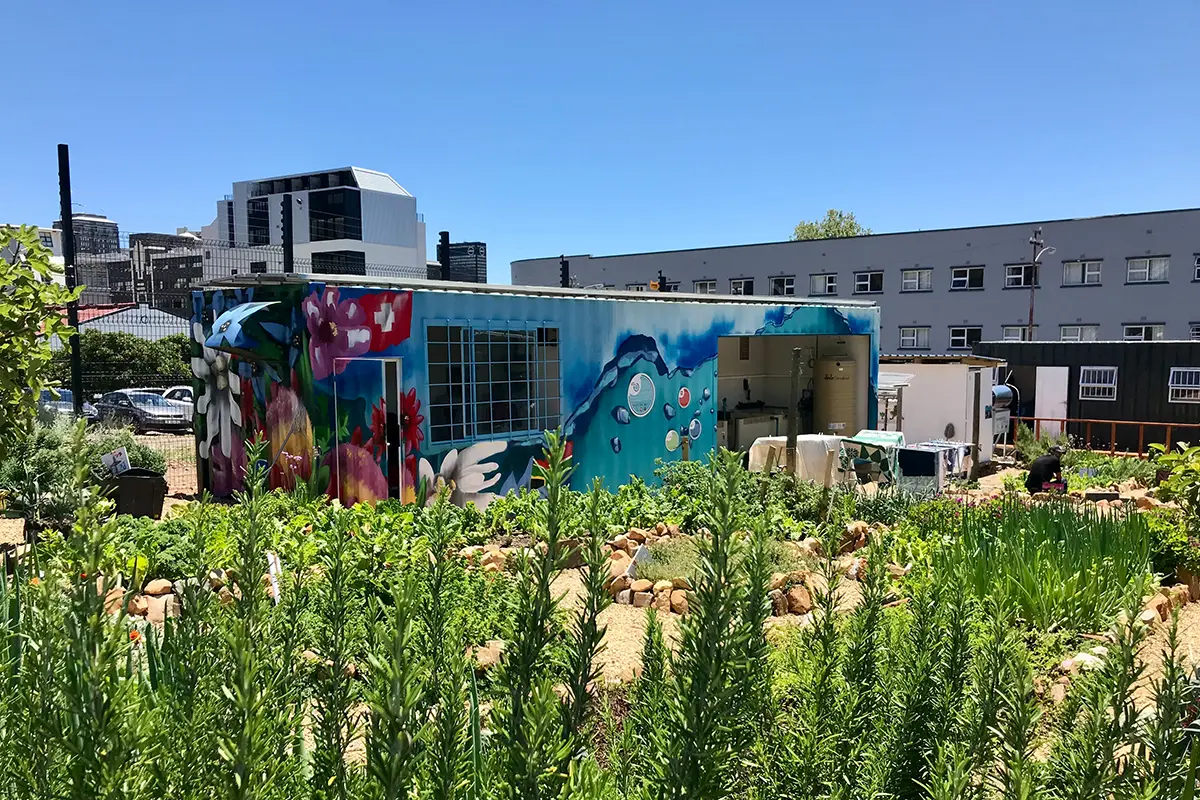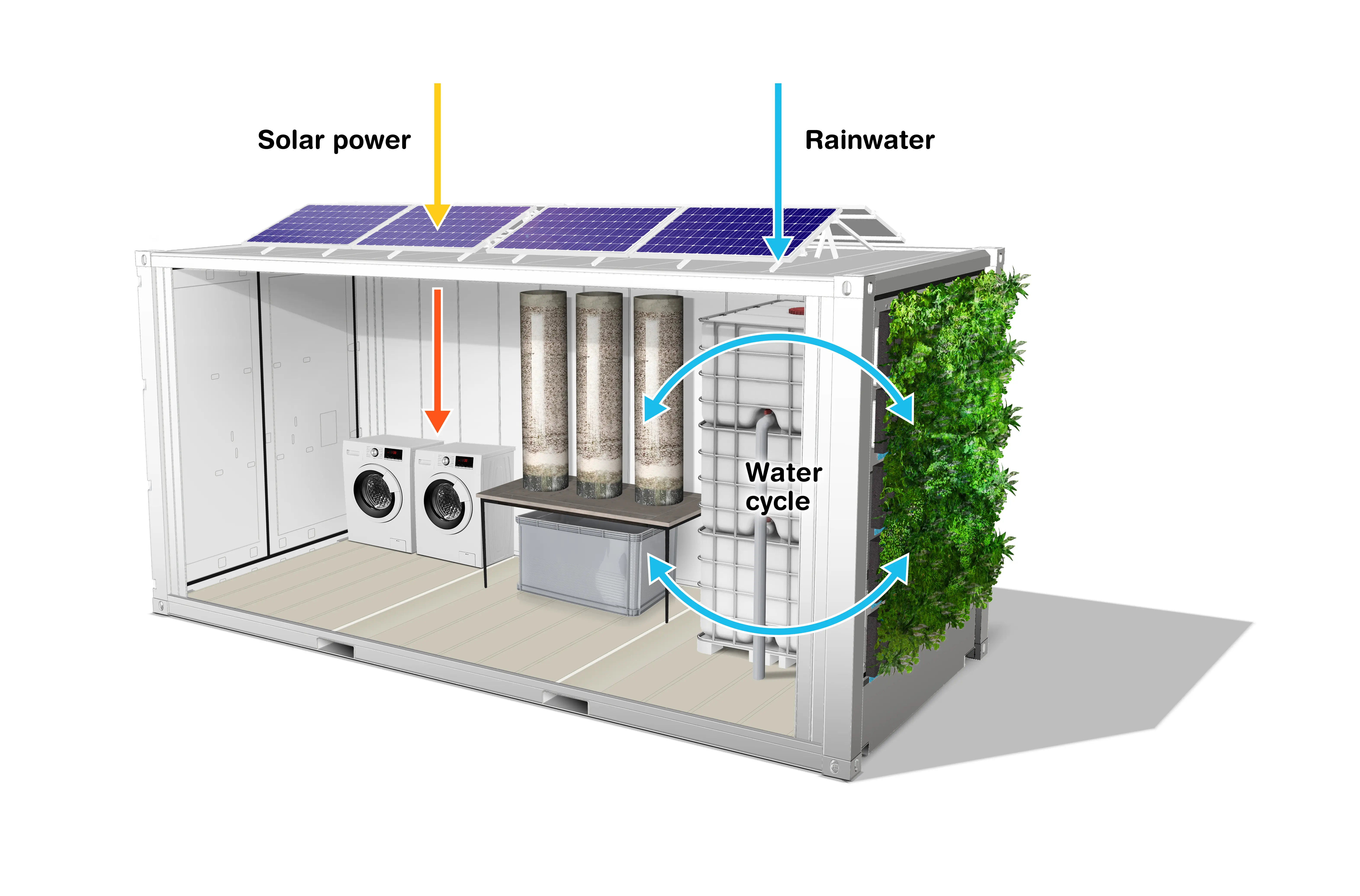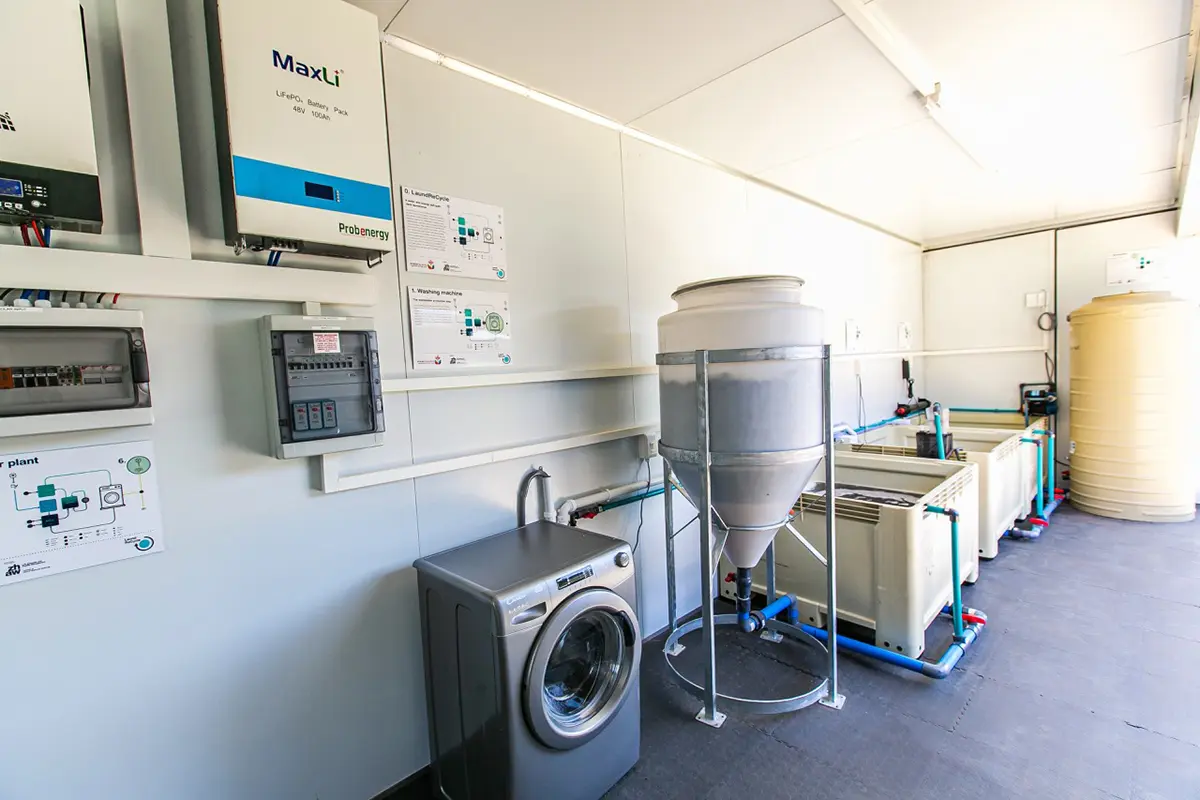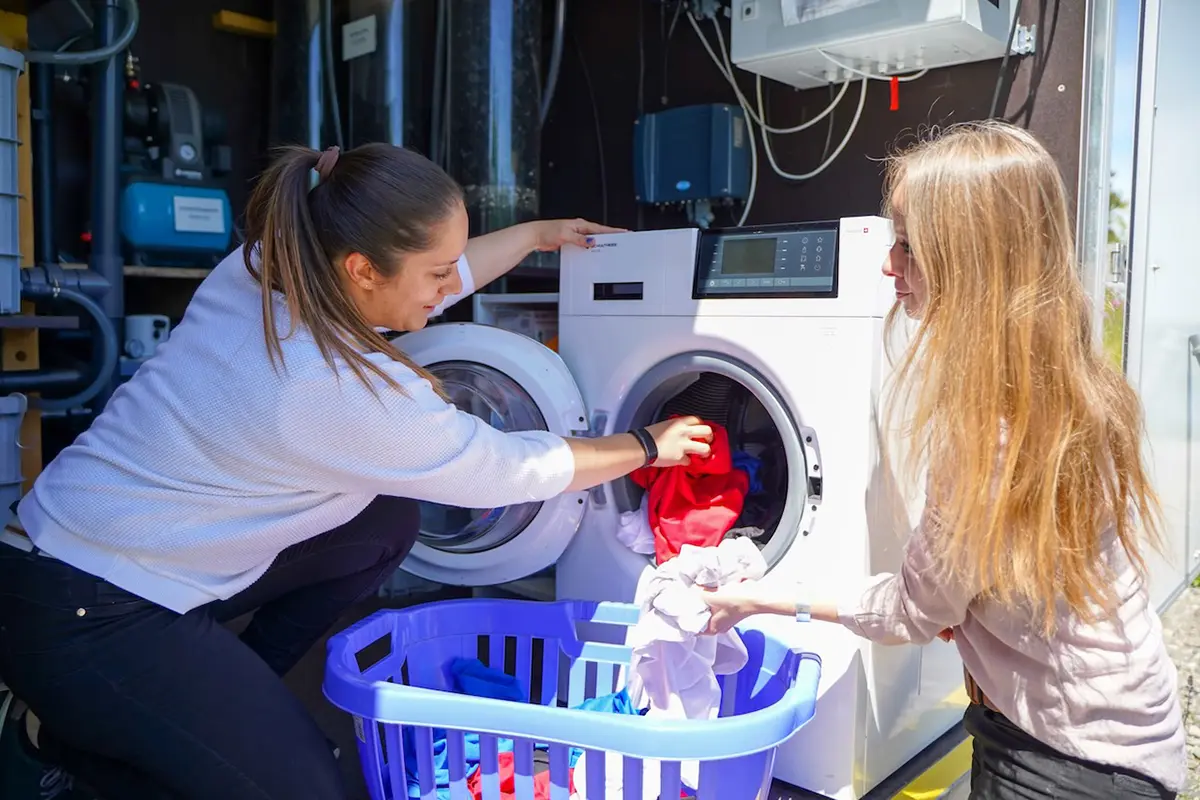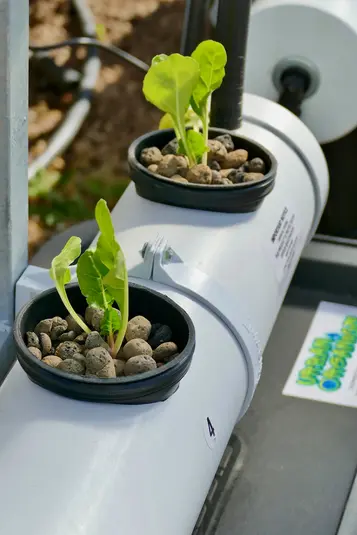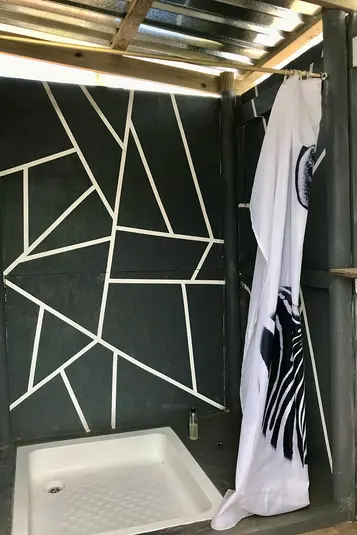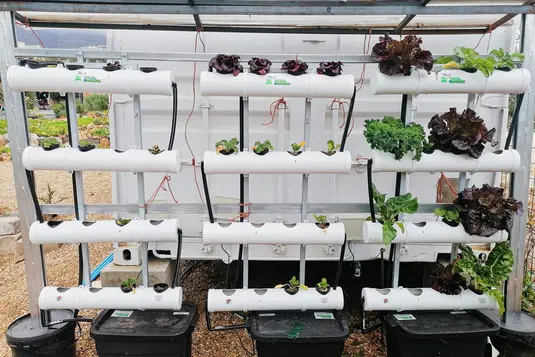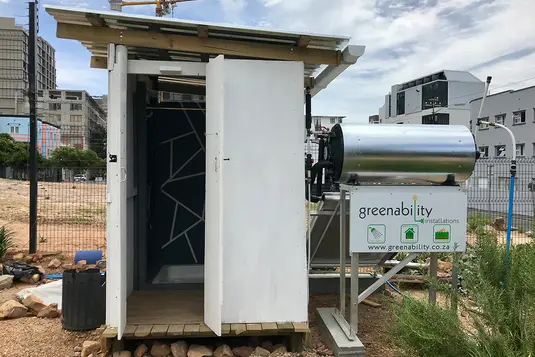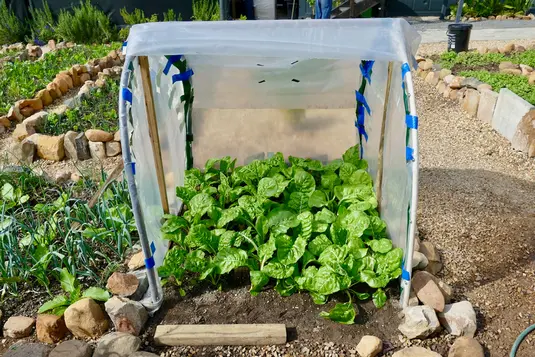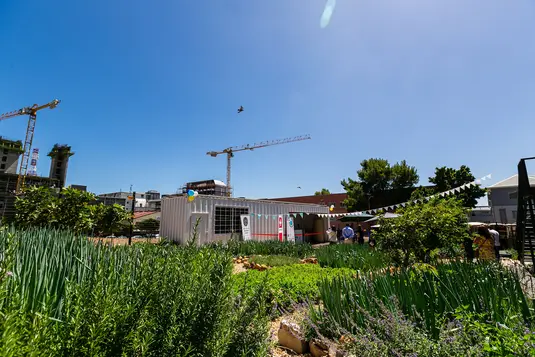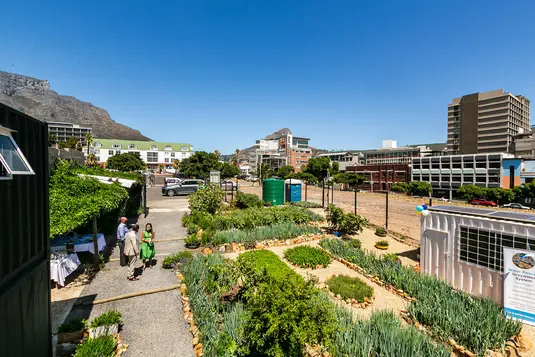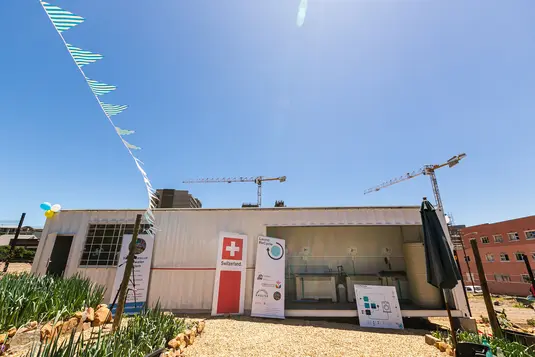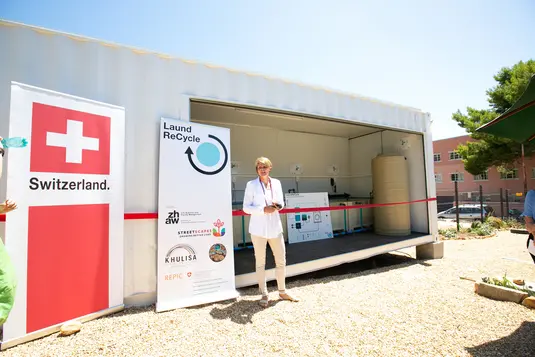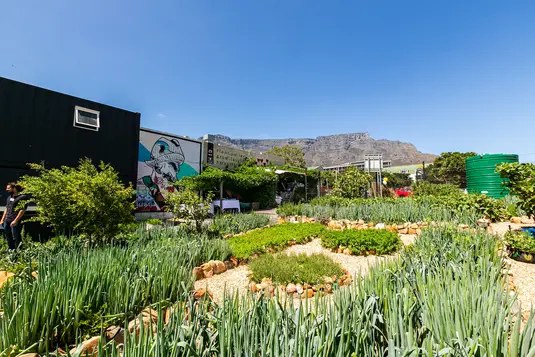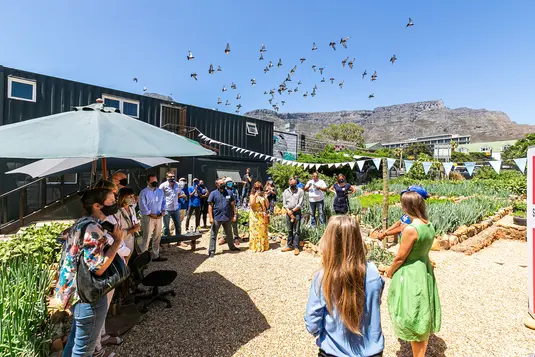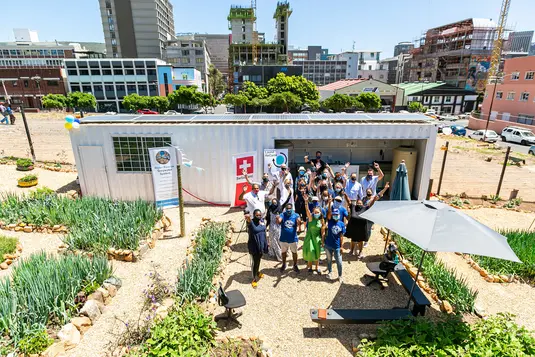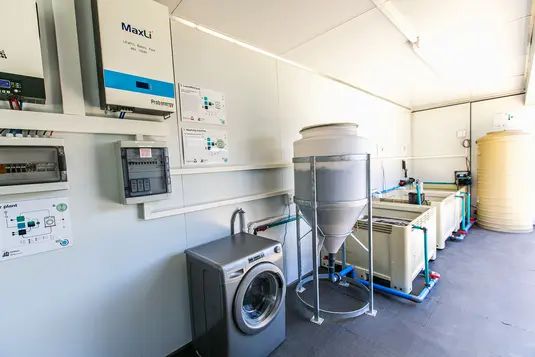LaundReCycle – a Water and Energy Self-sufficient Laundromat
South Africa’s water resources are under pressure and the development of new solutions is urgently needed. The aim of the LaundReCycle project is to develop a water- and energy self-sufficient laundromat that does not require any power, fresh- or wastewater connection and offers socio-economic development to local communities.
Project background
While the City of Cape Town has already experienced a severe water crisis in 2018, other regions across the country are increasingly at risks of facing the same fate. At the same time, there are many people without access to laundry services such as residents from rural and informal settlements or homeless people. While there is an increasing demand for laundry services, the use of washing machines is often limited due to the lack of access to household water services and stable electricity supply.
With the aim to offer access to laundry services, and to enable a sustainable water and energy supply, the project aims to develop the LaundReCycle in order to address two topics:
- Enabling water and energy self-sufficiency: The LaundReCycle system is an autonomous unit that can be installed in places without direct freshwater, sewer or grid connection or in any region, where water is a restricted resource.
- Local community empowerment: The LaundReCycle offers educational opportunity, income generation, and economic growth potential for residents by i) offering training particularly for youth and females, ii) creating micro-enterprises and jobs along the value chain, iii) relieving residents of manual washing, in particular females, and therefore providing more time for income generation through other activities.
The project develops and improves the LaundReCycle in terms of technical, financial and operational performance. The LaundReCycle prototype in Switzerland tests the technical feasibility and main operational aspects before full transfer of knowledge to the South African partners for the construction of South African prototype in the City of Cape Town. The purpose of the prototype in South Africa is to analyse the operational performance and social aspects. Lastly, specific actions will be taken towards entering the market in South Africa.
Technological Approach
The technology of the LaundReCycle is based on so-called "short-cycling system", where the wastewater of the washing machine is treated on-site and constantly reused for the same purpose, namely laundry. The system is based on a resource efficient low-tech approach and the exploitation of natural processes.
In a first step, the wastewater is mechanically pre-treated by separating solids and removing excess detergent from the wastewater. In a second step, the water is biologically treated in a trickling filter column and a green wall. Water losses are compensated through rainwater collection. The system is powered by a stand-alone photovoltaic system with battery storage.

News
August 2023: Project completion and outlook
The project funded by REPIC for the development and technology transfer of the LaundReCycles was successfully completed in July 2023. The completed final report (PDF 1.29 MB) is available. The pilot facility of the LaundReCycles, located in the heart of Cape Town, South Africa, continues its operations under the management of the non-profit organization Streetscapes. You are welcome to drop off your laundry or visit the facility even without laundry. The facility's location can be found here.
Our research on closing local water cycles in South Africa continues. You can find all information about the new project, “The Low-Tech Water Project” in Cape Town, here: https://www.zhaw.ch/en/research/project/74630
May 2022 - Public washing days on ZHAW Campus Grüental
The LaundReCycle prototype, also called "MODO", will host twice per week public laundry days starting May 7, 2022. Bring your dirty laundry and learn more about the eco-technology research. All other information can be found here: www.zhaw.ch/iunr/modo/en
November 2021 - The LaundReCycle gets a new look
Under the motto "Art & Science for Green Transition", the container of the LaundReCycle in Cape Town was artistically painted by a local artist on the themes of water, nature and the cooperation between Switzerland and South Africa. In addition, a painting workshop for children from under-resourced areas was held in the garden of the LaundReCycle. In a celebration for the local partners and invited guests, the artwork was inaugurated together with the Swiss Embassy.

August 2021 - LaundReCycle extended with shower and irrigation
As part of their bachelor theses, the two students Nastassja Koller and Pascal Hauser of the ZHAW Environmental Engineering degree program extended the LaundReCycle in Cape Town with a shower and hydroponic system. The wastewater from the shower is treated together with the wastewater from the washing machine in the LaundReCycle. Some of the treated water was used experimentally to irrigate the hydroponic and a vegetable bed. This brings the LaundReCycle one step closer to a completely decentralized and self-sufficient water system that not only produces clean water, but also provides sanitation connected to local food production.
January 2021 - Pilot plant launched in Cape Town
Together with the Swiss Embassy and local partners, the pilot plant of the LaundReCycle was launched in Cape Town on January 29, 2021. With this step, the test phase in real operation started. Together with the NGO Khulisa, the LaundReCycle will be tested and further developed both technically and economically.

Media and Publications
Publikationen in Deutsch
- Artikel: Vor Ort, Was in Sachen Nachhaltigkeit und Umwelt in Ihrer Region läuft, Die Umwelt, 03.02.2022 (PDF 148 kB)
- SRF: Ökowäscherei mit Wasserrecycling, SRF 10vor10, 09.06.2022
- Artikel: Südafrika ist nicht mehr weit weg , Wädenswiler Anzeiger, 25.05.2022
- Artikel: Der Waschsalon, der auch in der Wüste funktioniert, Tagesanzeiger, 09.05.2022
- Artikel: Der Waschsalon, der Strom selber macht und Wasser wiederverwendet, Zürichsee-Zeitung, 31.05.2021
- Artikel: Südafrikas Waschproblem: Hat eine Schweizerin die Lösung?, swissinfo.ch, 31. 01 2021
- Artikel: Waschen für die Wissenschaft, erschienen im IUNR Magazin, Januar 2020, Seite 14
Publications in English
- REPIC Final Report: A Water- and Energy Self-sufficient Laundromat (PDF 1.29 MB)
- Article: LAUNDRECYCLE – WATER- AND ENERGY SELF-SUFFICIENT LAUNDRETTE, SwiTT Report, 2022 (PDF 465 kB)
- Article: This eco-laundromat and urban farm have become a caring inner city hub, twyg 04.10 2021
- Article: Towards Water and Energy Self-Sufficiency: a Closed-Loop, Solar-Driven, Low-Tech Laundry Pilot Facility (LaundReCycle) for the Reuse of Laundry Wastewater, July, 2021
- Youtube: A cleansing initiative, Human Rights Month, 18.03.2021
- TV: SA’S FIRST OFF-GRID ECO-LAUNDROMAT, Cape Town TV, 17.02 2021
- Article: SA's first off-grid eco-friendly laundromat opens in Cape Town, CapeTowner etc, 11. 02.2021
- Article: Self-sufficient laundry, News24, 02.02.2021
- Article: Streetscapes opens eco-laundromat, CapeTowner, Februar 2021
- Article: LaundReCycle - Water after «Day Zero», TRANSFER, Page 13, Februar 2020 (PDF 434 kB)
At a glance
- Project leader: Devi Bühler
- Deputy of project leader: Prof Dr Ranka Junge
- Project team: Matthias Frei, Nadine Antenen, Bernard Wessels
- Project duration: 2019 - 2022
- Funding partner: Federal government (REPIC Platform)
- Project partners: Water Rescue, Khulisa, Abderhalden Gartenbau AG
- Contact person: Devi Bühler
Team
-
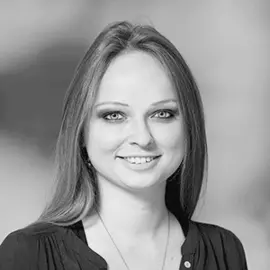
ZHAW School of Life Sciences and Facility Management
Institute of Natural Resource Sciences
Grüentalstrasse 14
8820 Wädenswil
External members
- Bernard Wessels
This might also interest you
Project MODO
Without water and electricity connection wash clothes and use toilets. Be part of the research.
Applied science
Get the latest news about current projects and research results in the newsletter TRANSFER.
IUNR intern magazine
Our magazine will give you an insight into studying and researching at IUNR.
Project MODO
Applied science
IUNR intern magazine
Without water and electricity connection wash clothes and use toilets. Be part of the research.
Get the latest news about current projects and research results in the newsletter TRANSFER.
Our magazine will give you an insight into studying and researching at IUNR.
